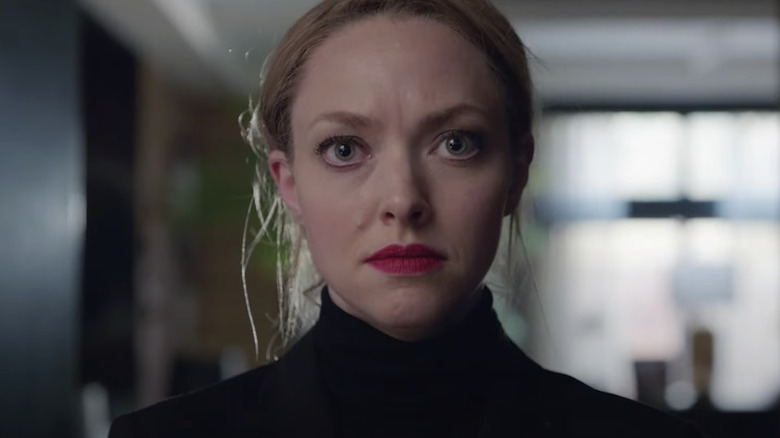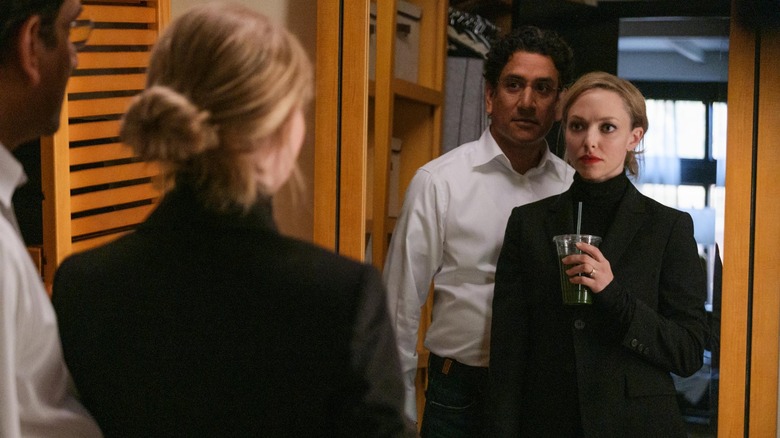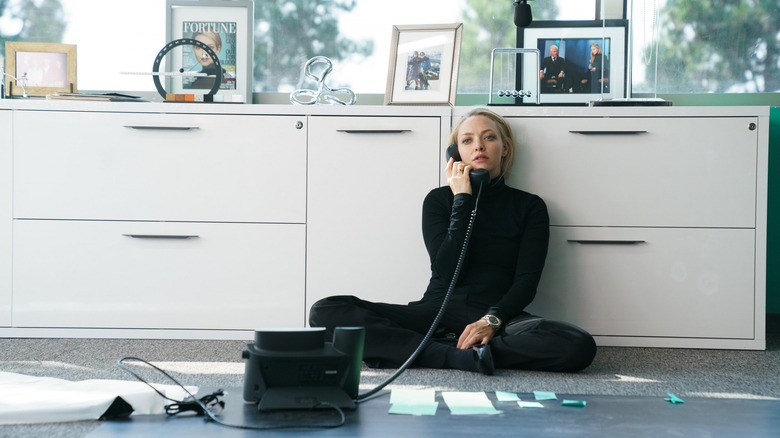The Dropout Review: Amanda Seyfried Channels Elizabeth Holmes In This Highly Watchable Miniseries
The trial of Elizabeth Holmes officially concluded earlier this year, but that certainly didn't mark the end of her name flashing across headlines. Hollywood has taken a very special interest in the tech icon turned guilty fraudster, especially given the persistent popularity of true crime, where a story like hers has enough weight to inspire a miniseries (or two). Scammer stories and Silicon Valley downfalls are the talk of the town, an obsession proven by the various films and TV shows slated to hit screens later this year, each tracing the rise and fall of tech companies, charismatic CEOs, and the briefly successful scams they ran on unsuspecting victims. Between the proximity of their release and the mirrored strictures, they share so much in common that the repetition is bound to become grating. And it certainly doesn't help that most center on events so recent we can still recall the detailed coverage. How many times can we watch the same story unfold? And why watch the fictional version when we can stick to the facts?
"The Dropout" is busy enough just retelling the story of Holmes' whirlwind rise to prominence and inevitable downfall, but doubles its load to take on these questions, making the space to justify its own existence. Is the series required reading because it offers insight into the Holmes story? Not quite. After all, it adapts the ABC podcast of the same name. Dramatizing the story eviscerates our ability to find direct truth in its finer details — if you need an accurate retelling of Holmes' story, there's endless news coverage, podcasts, books, and probably a docuseries in the works. This has to be something different that offers something new. So beyond its memorable performances and easy watchability, "The Dropout" also vyes for greater depth. Will you find that depth in the doubt that plagues Elizabeth Holmes? The fear of being left behind creeping up on elites of the past, like Jay Rosan? Or the crushing anxiety that haunts lab workers, Ian Gibbons, Erika Cheung, and Tyler Shultz? It goes without saying that this story is compelling, but "The Dropout" shines when pushed beyond its retelling, to make the human element the star of the show.
The very watchable downfall of Elizabeth Holmes
As true-crime series are wont to do, "The Dropout" begins at the end: following her grand fall from grace, with Elizabeth Holmes being questioned in a deposition. This is our first glimpse of Amanda Seyfried as CEO of the ill-fated Theranos, her hair frazzled, her signature turtleneck nowhere in sight, and her confidence certainly lacking. To counter, we jump back a few years to see the picture-perfect Holmes you'll remember from the high points of her career: a tech star being trailed by a camera or prompted by documentary filmmaker Errol Morris. She shows off the Theranos offices and boasts high achievements we already know to be false. Then the story truly kicks off by jumping back to the very beginning: a young Elizabeth the summer before college, determined for greatness before the idea for Theranos had even taken root. This is the foundation that the rest of the series will build off of — everything from her lack of tact, her determination, and especially her frustration at being brushed off by her peers.
A key thread through the series is Elizabeth's connection with Sunny Balwani (Naveen Andrews), who would go on to be her partner in business and love. Though this detail remained a secret to the public up until the trial, its prominently featured right at the start of the show, for very good reason. This is a fascinating lens to see Elizabeth through and series creator Elizabeth Meriwether takes special interest in the many angles for understanding Holmes. Whether it be through her relationship with Sunny, the investors she charms, the enemies she makes, or the employees she inspires, there are many ways to read her story, and "The Dropout" tries to tackle each different angle. The downfall of Elizabeth Holmes is wider than just her, it marks the downfall of the many people sucked into her orbit: the willing, like Sunny, and those who realize they're on a sinking ship much too late, like Ian Gibbons (Stephen Fry), a biochemist who worked for Theranos.
"The Dropout" certainly doesn't take the "Dopesick" approach to its tale — there is a particular element of humanity missing from this story. Those in the throes of Theranos take center stage, and while we learn the larger implications of the company's lies (actual patients being misdiagnosed), time spent on that reality is from a certain distance. It's a missed opportunity to never confront this from outside Elizabeth's orbit and harder to swallow given time spent on others, like the old white men worrying about the takeover of young thinkers. But at least in telling Gibbons' tale and the questioning medical ethics with whistleblower Erika Cheung, "The Dropout" paints a wider portrait of Theranos' impact. Circulating these different perspectives is where the show thrives, giving humanity to what may otherwise be abstract elements of the medical scandal. But exploring Holmes is still the show's #1 priority.
Pushing beyond the retelling
As the story progresses, Seyfried's Holmes has a tendency to learn from one moment and launch it into another, done to the unsettling effect by the actress who wears her fear and doubt in one scene, then completely lacks empathy in the next. "I don't feel things the way other people feel things," she tells Sunny, by which point, we've connected those dots ourselves. While "The Dropout" isn't overly concerned with our ability to empathize with Elizabeth, the first half of the season certainly spends time on her sympathetic rise and the struggle of being in power. Then, as the story unfolds and her actions take a turn from negligent to downright criminal, it's much less about feeling for her than it is about understanding her every move. Now if you've listened to "The Dropout" podcast, you'll find yourself mentally crossing off the moments and testimonies the show is pulling from, so it won't be hard to figure out the episode by episode structure, to know which big development will close out each chapter. But fiction gives "The Dropout" license to speculate and dig further into its characters.
It's only been so many years since the Theranos whirlwind transpired and we're years away from truly understanding the long-term implications of Holmes' legacy. So it's natural to wonder: is it too soon to rehash something we haven't even digested into our collective consciousness? But "The Dropout" isn't especially interested in the question of the aftermath, instead interrogating the reasons behind our obsession with Holmes in the first palace. Why she lied gets about as much airtime as another big question — why did people let her? What is it that everyone was projecting onto this woman? This gives the show a welcome boost, pushing it beyond just retelling Holmes' saga. "The Dropout" might very well be the best-case scenario for the true crime rehash era, as a show that isn't just retelling a story but trying to understand its grander significance. It still falters in places and leaves me wondering how much empathy I can extend to the ultra-rich embroiled in crisis, but it sparks intrigue. Plus, it grants us another star-making turn from Amanda Seyfried and brings together a ridiculously stacked cast for what's ultimately an easy-to-binge eight hours of TV.
"The Dropout" premieres on Hulu with the first three episodes on Thursday, March 3, 2022, and additional episodes will roll out weekly until April 7, 2022.


